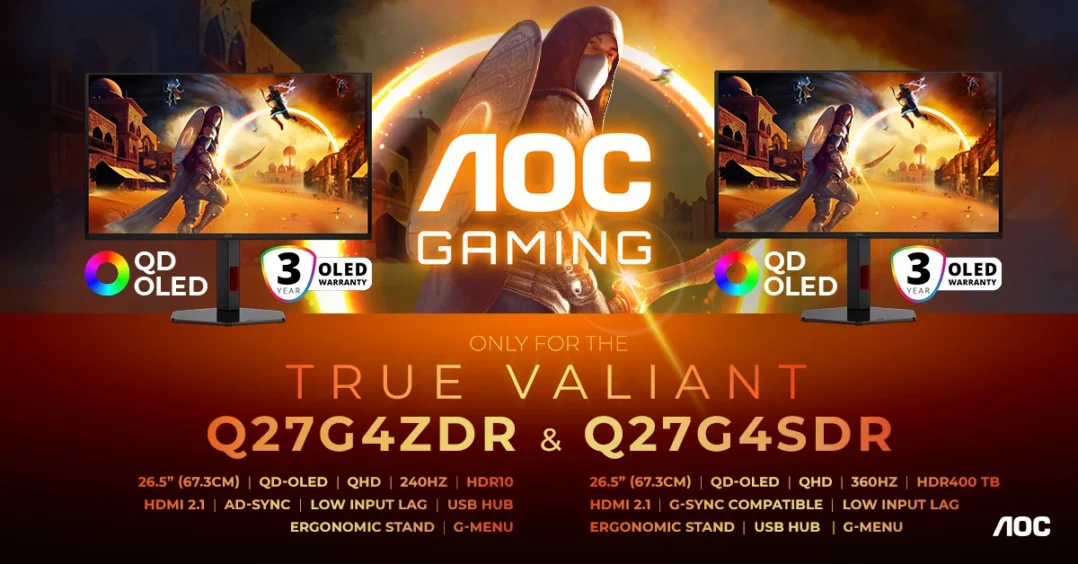After building a reputation for value-oriented gaming displays, AOC has announced its first foray into the premium QD-OLED segment. The company revealed two 27-inch monitors, the Q27G4ZDR and Q27G4SDR, both targeting competitive gamers but at notably lower price points than most existing QD-OLED displays on the market.
These are part of a shift in the OLED monitor landscape, which has historically carried premium pricing, but even Samsung is moving into a more affordable segment.
While competitors’ QD-OLED monitors often start around $600-$650 and can exceed $1,000 for higher-end models, AOC’s anticipated US pricing (estimated at $430-650 based on European MSRPs) would bring the technology within reach of a broader audience.
| Specification | Q27G4ZDR | Q27G4SDR |
|---|---|---|
| Panel Type | 27-inch QD-OLED | |
| Resolution | 2560×1440 (QHD) | |
| Pixel Density | 110.84 PPI | |
| Refresh Rate | 240Hz | 360Hz |
| Response Time | 0.03ms GtG | |
| Color Depth | 10-bit (1.07 billion colors) | |
| Color Gamut | 147.6% sRGB, 99.1% DCI-P3 | |
| HDR Support | HDR10 | VESA DisplayHDR True Black 400 |
| Peak Brightness | 400 cd/m² | 1000 cd/m² |
| Contrast Ratio | 1.5M:1 | 1.5M:1 |
| Adaptive Sync | FreeSync Premium, G-SYNC Compatible | |
| Connectivity | 2× HDMI 2.1, DisplayPort 1.4, USB 3.2 hub with fast-charging | |
| Console Support | QHD @ 120Hz (PS5, Xbox Series X/S) | |
| Warranty | 3-year burn-in warranty | |
| Price (MSRP) | £399 | £469 |
| Availability | Mid-November 2025 | |
(Only GPB pricing was available at the time of writing)
Market Positioning
The pricing is a welcome departure from what gamers have come to expect in the QD-OLED space. Most 27-inch QD-OLED monitors with similar specifications currently retail between $550 and $700, with some models exceeding $800.
To illustrate where these new AOC models fit, here’s a comparison with key competitors in the 27-inch 1440p QD-OLED segment:
| Monitor | Panel Type | Refresh Rate | Typical Price (USD) | Notable Features |
|---|---|---|---|---|
| AOC Q27G4ZDR | QD-OLED | 240Hz | ~$430-500* | Entry-level pricing, 3-year burn-in warranty |
| AOC Q27G4SDR | QD-OLED | 360Hz | ~$590-650* | Higher refresh, True Black 400 HDR |
| Gigabyte AORUS FO27Q3 | QD-OLED | 360Hz | ~$620-650 | USB-C, KVM switch |
| MSI MPG 271QRX | QD-OLED | 360Hz | ~$700 | AI features, premium build |
| Dell Alienware AW2725DF | QD-OLED | 360Hz | ~$620-650 | Premium design, eARC support |
| ASUS ROG Strix XG27AQDMG | WOLED | 240Hz | ~$650 | Glossy finish, anti-flicker tech |
| MSI MAG 273QP X24 | QD-OLED | 240Hz | ~$600 | OLED Care 2.0 |
*US pricing are estimates based on £399/£469 UK MSRP and typical regional pricing patterns.
What’s particularly interesting is that even AOC’s estimated US pricing would undercut budget-friendly competitors. A similar 240Hz model recently dropped to $399.99 during a sale, making headlines for being one of the lowest prices ever seen for a QD-OLED display. If AOC’s monitors arrive in the US around $430-500, they’d establish a new baseline for QD-OLED pricing at MSRP rather than requiring sales or promotions.
Technical Highlights

QD-OLED Technology
Unlike traditional WOLED panels from LG, QD-OLED technology from Samsung combines organic light-emitting diodes with quantum dot color filters. This approach should deliver wider color gamut coverage and higher color volume compared to WOLED displays, though it can exhibit slightly elevated black levels in bright ambient lighting due to its semi-glossy coating.
Both AOC models achieve 99.1% coverage of the DCI-P3 color space—the standard used in digital cinema—which should translate to vibrant, saturated colors in HDR content and games that support wide color gamuts.
Response Time and Motion Clarity
The 0.03ms gray-to-gray response time is characteristic of OLED panels, where each pixel can transition nearly instantaneously. This eliminates the ghosting and motion blur that can affect LCD panels, even high-end ones. For competitive gaming in titles like Counter-Strike 2, Valorant, or Apex Legends, this level of responsiveness can provide an advantage.
HDR Performance
The key differentiator between the two models lies in their HDR implementation. The Q27G4ZDR supports basic HDR10 with 400 cd/m² brightness, which should handle HDR content reasonably well but won’t deliver the impact of higher-tier certifications.
In contrast, the Q27G4SDR carries VESA’s DisplayHDR True Black 400 certification and peaks at 1000 cd/m² brightness. The True Black standard is specifically designed for OLED displays and indicates the monitor can produce true zero-level blacks while hitting specified brightness targets—creating more dramatic contrast than traditional HDR400 certification allows.
Burn-In Protection
Following industry practice established by competitors like MSI and ASUS, AOC includes a three-year warranty covering burn-in. While OLED burn-in is still a consideration for users who display static content for extended periods, manufacturers have implemented various protective measures including pixel shifting, screen savers, and brightness limiters for static elements.
For users primarily gaming rather than using the monitor for productivity work with static toolbars and menus, burn-in is usually a minimal risk during the warranty period.
Connectivity and Features
The connectivity suite mirrors what’s become standard in modern gaming monitors. Dual HDMI 2.1 ports allow full 4K 120Hz support for PlayStation 5 and Xbox Series X/S, though both consoles will output at the monitor’s native 1440p resolution. The inclusion of a USB 3.2 hub with fast-charging capability adds convenience for peripherals and mobile device charging.
Gaming-specific features include:
- Shadow Control: Brightens dark areas without overexposing highlights
- Game Color: Adjusts color saturation for visibility or preference
- Low Input Lag Mode: Minimizes processing delay
- Customizable Presets: Save settings for different games or content types
Both monitors support AMD FreeSync Premium and are G-SYNC Compatible, providing variable refresh rate support across both GPU manufacturers. The Q27G4SDR’s 360Hz refresh rate positions it for high-frame-rate competitive gaming, though realistically achieving those frame rates at 1440p requires above-average graphics hardware.
Availability
Both monitors will be available from mid-November 2025. Pricing has been confirmed at £399 for the Q27G4ZDR and £469 for the Q27G4SDR in the UK market. European pricing varies by region, ranging from €399-469 for the 240Hz model and €549-649 for the 360Hz variant. US pricing hasn’t been officially announced yet, though based on AOC’s typical regional pricing and currency conversion patterns, these models would likely land somewhere in the $430-500 range for the Q27G4ZDR and $590-650 for the Q27G4SDR.

